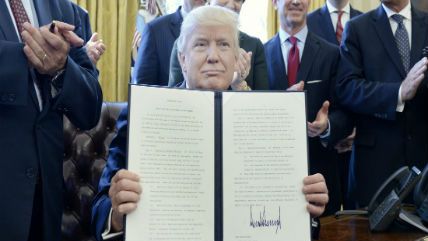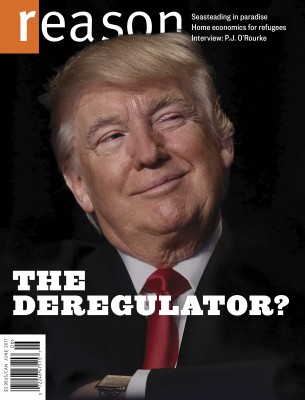Trump's Repeal of a Welfare Drug-Testing Regulation Backfires (Thankfully)
Arguably the most questionable of the 14 new Congressional Review Act regulatory repeals may have the unintended consequence of limiting states' ability to drug-test those seeking unemployment benefits.


The 1996 Congressional Review Act, which gives Congress a limited time window after a regulation is implemented to repeal it, was successfully used just once in its first two decades in existence. That all changed in the first half of 2017, as a GOP-led Congress took advantage of a new, actively deregulatory Republican president to roll back a total of 14 late Obama-era rules.
Eyeballing the list (and also consulting Reason's work on the specific bills; on which see more below), only one of the CRA repeals stuck out at me as facially unfortunate: the rollback of a 2016 Labor Department rule defining which occupations that states can drug-test for (as authorized by the Middle Class Tax Relief and Job Creation Act of 2012) when disbursing federal unemployment insurance. The qualifying jobs, according to Bloomberg, were mostly "limited to the transportation and pipeline industries, as well as jobs that require carrying a gun or were already legally mandated to have drug tests, such as nuclear plant staff." Republicans like Sen. Ted Cruz (R-Texas) found the list too limiting, and therefore "yet another instance of executive overreach by the Obama administration."
Republicans do love their drug-testing of welfare cases (individual welfare, mind you, never the corporate variety), regardless of the constitutionality or efficiency. Why, just look at how much fun it is!
Another one heads to President Trump's desk. This legislation allows states to have drug testing to receive federal unemployment benefits. pic.twitter.com/cFnvdeQqX1
— Paul Ryan (@SpeakerRyan) March 19, 2017
Or maybe not.
According to a perceptive and somewhat complicated piece by Bloomberg's Josh Eidelson, the CRA repeal actually "takes away some limited [drug-testing] authority states already had." How?
Because the 2012 law let states test people suited for jobs specified by federal regulations, now that those regulations have been scrapped, there are no jobs for which states are able to test for drugs. Before Congress revoked Obama's rules, states could have tested aspiring pipeline operators and commercial drivers; now they can't.
In other words, congressional Republicans went after the enacting interpretation, while kinda-sorta forgetting the underlying legislation that they themselves wrote. If you don't want the Labor Department making rules, don't pass in your laws language like "an individual for whom suitable work (as defined under the State law) is only available in an occupation that regularly conducts drug testing (as determined under regulations issued by the Secretary of Labor)."
There's a lesson here, one that's shot through my June cover story on Trump's deregulatory efforts. The executive branch can do (and already has done) quite a bit of regulatory rollback on its own, but the whole reason you have not just regulations but the agencies writing and enforcing them is that Congress has made laws instructing the federal bureaucracy to do stuff. You can eliminate the Department of Education, but that won't stop the federal government from sloshing money toward public schools in the absence of rewriting legislation from the 1960s. It's easy for a legislator to throw stones at an out-of-control bureaucracy (or more fruitful yet, nobly guide his or her constituents through all the red tape); much harder to undo what Congress has already done.
So what's next on drug-testing unemployment recipients? Unless Congress gets off its duff, "States will get to impose broader testing requirements only if the Labor Department goes through its own formal rule-making process to issue stricter regulations," Bloomberg concludes. That process takes roughly one to three years. But even then, there's a catch that likely few people in the Trump administration had thought through:
[T]he 1996 review act bans an agency whose regulation has been voided from enacting any new regulation that's "substantially the same." Before Trump took office, the law had been used only once, to undo ergonomics rules issued under President Bill Clinton, and no president tried to regulate that area again. Any regulation [the Labor Department] comes up with is likely to be challenged in court on the grounds that it resembles Obama's. "Nobody can predict with any degree of confidence how a court is going to react to any rule that covers the same subject matter," says Richard Pierce, a George Washington University law professor.
We shall see if the "substantially the same" clause trips up Trump's other CRA repeals. In the meantime, after the jump, here are two dozen Reason pieces on the new administration's deregulatory activity to date, in reverse chronological order:
* "Report: Regulation 'Has Essentially Ground to a Halt' Under Trump: The Obama administration submitted 118 new rules in the same time it has taken Trump to make just 39," by Matt Welch.
* "Rand Paul's REINS Act Finally Makes It to Senate Floor: A new high water mark for regulatory reform, but another bill might eclipse Paul's proposal," by Eric Boehm.
* "The Left Is Rebranding Environmental Regulations As Environmental Protections: Cloaking government control in the language of benevolence," by Ronald Bailey.
* "Congressional Deregulation Effort Stalls at Methane Rule Repeal: States and industry will seek to roll back BLM's 'vast overreach' of regulatory authority in court," by Ronald Bailey.
* "EPA Bureaucracy Strikes Back: The Case of the Board of Scientific Counselors: How will the struggle between the permanent bureaucracy and the EPA's new leadership play out?" by Ronald Bailey.
* "Could Trump's Deregulation Be a Lifeline for Struggling Entrepreneurs?: If he uses it right, the president's experience with taxes and red tape could benefit workers and small businesses," by J.D. Tuccille.
* "The Fear-Based Campaign to Control the Net: A transparent attempt to establish government control over the rare place where freedom is still highly regarded," by Veronique de Rugy.
* "Trump May Dabble in Deregulation, But He Doesn't Believe in Free Markets," by John Stossel.
* "Plan to Roll Back Internet Regulations a Boon for Business and Innovation: Goodbye and good riddance to the Obama administration's 'Open Internet Order,'" by Andrea O'Sullivan.
* "Trump's First 100 Days: At Least He Picked Some Good People to Run Things: The best thing about Trump's administration is the parts that aren't Trump (or Jeff Sessions)," by Eric Boehm.
* "FCC Chairman Ajit Pai on Why He's Rejecting Net Neutrality Rules: 'We were not living in a digital dystopia in the years leading up to 2015,'" by Nick Gillespie and Mark McDaniel.
* "Media: Openly Using a Bill Clinton/Harry Reid Law = 'Stealth Assault on U.S. Regulations': More journalistic hysteria in the face of drop-in-the-bucket deregulation," by Matt Welch.
* "Trump Reversing Record Number of Regulations: President signs four more Congressional Review Act rollbacks, bringing total number to seven…or six more than all his predecessors combined," by Matt Welch.
* "Donald Trump's Climate Change Executive Order Will Make Energy Cheaper: But it will not bring back a lot of coal mining jobs," by Ronald Bailey.
* "Relax: Gutting the EPA Won't Make Your Air Dirtier and Water More Polluted: There have been diminishing returns to federal pollution regulation for a long time," by Ronald Bailey.
* "Trump Administration to Review Obama-Era CAFE Standards: 'We're going to work on the CAFE standards so you can make cars in America again,'" by Ronald Bailey.
* "Scott Gottlieb: Trump's Nominee for Food and Drug Administration Commissioner: Understands how over-regulation is slowing down innovation in medicines and foods," by Ronald Bailey.
* "New York Times Thinks Businesses Are Dogs That Need Pre-emptive Choking From Government: 'Leashes come off' corporations, newspaper warns, unwittingly suggesting why Trump's deregulations might have corrective merit," by Matt Welch.
* "Trump's Charge for FDA Regulatory Reform Could Be Good News for Snus: The Swedish-made cigarette alternative knows all about the FDA's 'slow and burdensome' permitting process. Some changes could make Americans healthier," by Eric Boehm.
* "Trump and How to Speed Up FDA Regulatory Approvals: Slashing the restraints on the agency's slow and burdensome process," by Ronald Bailey.
* "Trump Took a Break from Fearmongering to Approve Good Gun Rights Bill: Due process protections preserved for those getting Social Security benefits," by Scott Shackford.
* "Trump, Navigable Waters, and the EPA's WOTUS Regulations: Rolling back a 'federal land grab' or instituting an 'unmitigated disaster for fish and wildlife, hunting and fishing, and clean water'?" by Ronald Bailey.
* "Frankly, Trump's Plan To Review and Reform Dodd-Frank Makes a Lot of Sense: The president promises to prevent taxpayer-funded bailouts, and, hey, that makes sense too," by Eric Boehm.
* "The House Passes a Gun Measure Supported by the ACLU and Mental Health Advocates. Media Hysteria Ensues.: Bad reporting, and bad attitudes, make a sensible move to prevent the government from discriminating against certain Social Security recipients seem like sheer madness," by Brian Doherty.
* "Donald Trump May Try To Stifle Freedom of Expression but His FCC Head Ajit Pai Will Defend a 'Free and Open Internet': Pai favors free speech but not treating the Internet as a public utlity. That's exactly right," by Nick Gillespie.
* "Trump's Executive Order on Regulations Is Welcome, But More Is Needed: President Donald Trump followed-up a busy and divisive first week in office by issuing an executive order that takes aim at the federal regulatory state," by Eric Boehm.
* "Trump, House Republicans Target EPA, Energy, Interior for Regulatory Cuts: Trump plans to use executive orders to hack away at federal regulations, but he'll need congressional help to make lasting reforms," by Eric Boehm.


Show Comments (27)